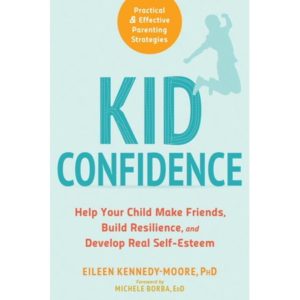

Previous efforts to boost children’s self-esteem (e.g., by giving every child a trophy) were misguided and counter-productive, leading to narcissism, reduced empathy, depression, and anxiety. Self-esteem is shaped by both natural temperament and experience. Children tend to have relatively high self-esteem in the first several years of life and then experience a reduction in self-esteem and an increase in self-consciousness in the pre-teen and teen years, when they become more self-focused.
Strong and healthy connections with parents, siblings, and friends are a critical source of confidence for young people. Kennedy-Moore suggests that how parents respond to children’s mistakes matters for their self-esteem. She suggests sequentially taking time to cool down, then broaching a conversation with the child by offering an excuse for why the child may have made the mistake, describing why the mistake was problematic, and encouraging the child to think about how he can ameliorate the situation and move forward. Conversely when children do something well, parents should show pleasure, offer measured praise, especially for actions within the child’s control, and teach children how to graciously accept compliments. Parents should teach children that we are all developing and have room for improvement. Sibling relations can boost self-esteem, but when a child compares himself to his siblings, which is common to do, problems may arise. Kennedy-Moore suggests parents avoid comparing siblings and instead celebrate each child’s successes and focus on shared values and traits in the family. To make friends children need not to avoid off-putting behaviors (e.g., emotional outbursts and tattle-tailing), so teaching self-calming exercises can be beneficially. Additionally, they need to build connections, so it is important to teaching about the role of reciprocity, kindness, and common-ground in friendships.
To experience self-confidence, children need to feel competent, which comes when they persist at difficult but worthwhile endeavors and when they let go of perfectionism, according to Kennedy-Moore. Parents can promote persistence by normalizing the experience of struggling. Stories of their own struggles or stories of the child overcome struggles when she was younger are effective. Parents can help children notice their own progress, guide children to engage in activities that will capitalize on their strengths, and help children find mentors. Parents can help counter perfectionism by: creating safe spaces to make mistakes; focusing on the learning process rather than performance outcomes; teaching the value of matching one’s effort to the importance of the task; and emphasizing that parents’ love does not need to be earned. Kennedy-Moore also suggests encouraging self-kindness by modeling kind self-talk and making time for fun activities.
Children with low self-esteem may struggle to make even simple decisions. Parents can deconstruct common myths about decision-making, e.g., teaching that there is no singular perfect choice to be uncovered if one simply analyzes the situation thoroughly enough. Parents can give kids opportunities to make simple choices and show that we need to make the most of the decisions we make.
Children with low self-esteem may also feel different than their peers. Parents can help by teaching children how to talk about their differences with pride and how to deal with prejudice. Offering examples of inspiring people with similar differences, helping the child see himself as a whole-person and not just someone with one difference, and encouraging children to contribute their talents to help others are ways to reduce feelings of “differentness.” Additionally, teaching children about media biases can reduce the extent to which the media exacerbates their feelings of differentness. If children are facing bullying, parents can help their children learn to be a less attractive target for bullying by caring less about the bullying behavior and learning to ignore mean gossip. It may be necessary also to enlist help from a teacher.
Kennedy-Moore concludes by suggesting that helping children move past the frequent self-evaluation that undermines confidence, involves them experiencing compassion, awe, and deep engagement with activities. These experiences connect us to other people, make us appreciate the vastness of our world, and ground us in the present moment. As children come to have more and more of these experiences, they will develop genuine and enduring self-esteem, which will set them on a trajectory of success and fulfillment.
Kennedy-Moore, E. (2019). Kid Confidence: Help Your Child Make Friends, Build Resilience, and Develop Real Self-Esteem. Oakland, CA: New Harbinger Publications.




